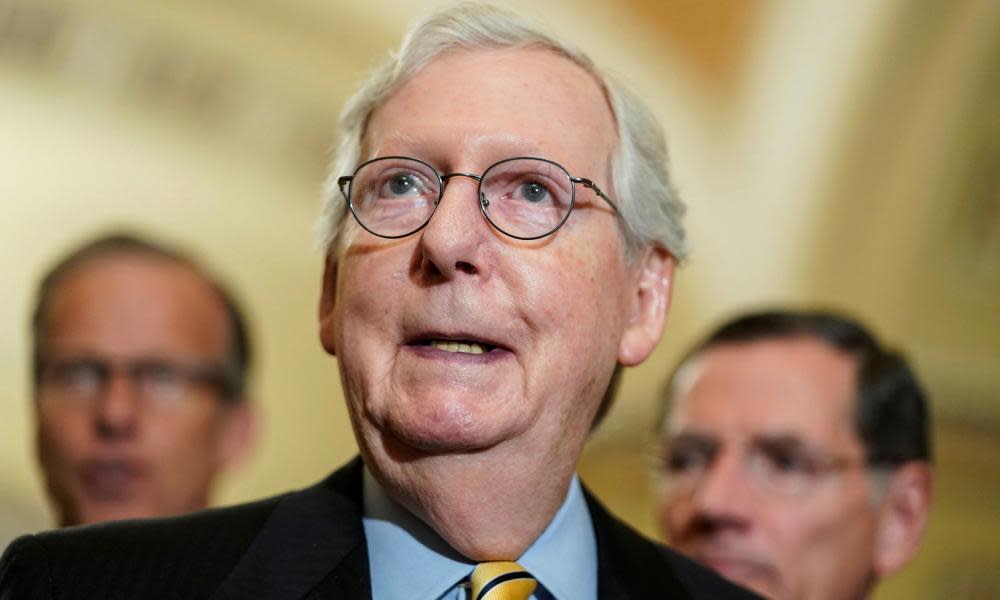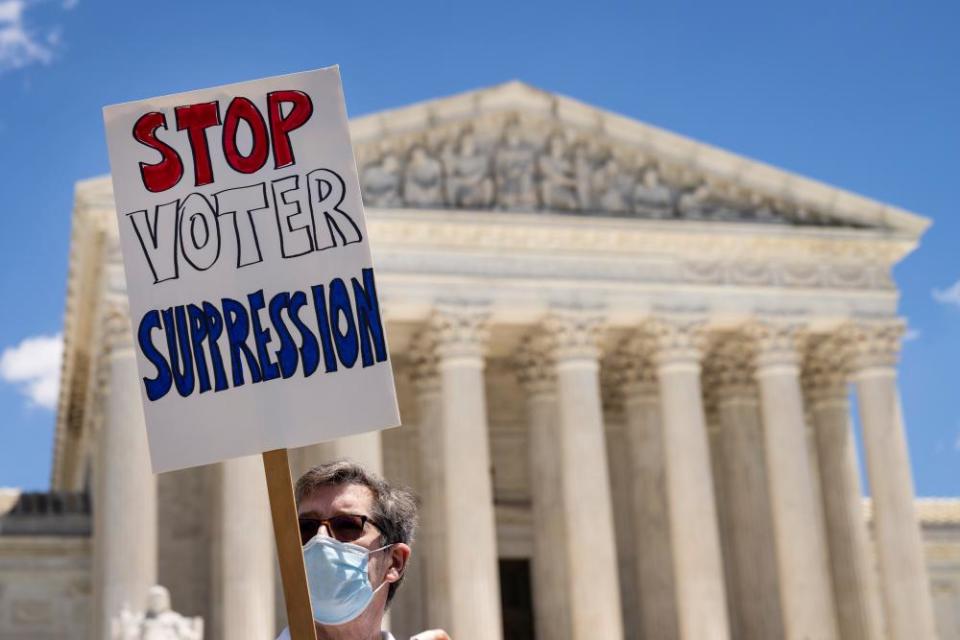How Mitch McConnell has unified Republicans as a red wall against Biden’s agenda

- Oops!Something went wrong.Please try again later.
- Oops!Something went wrong.Please try again later.
- Oops!Something went wrong.Please try again later.
- Oops!Something went wrong.Please try again later.
It was a glimpse of Washington past. Beneath the vaulted ceiling and stained glass windows of the national cathedral, Joe Biden greeted Mitch McConnell and other senators in the pews, then offered a hymn to bipartisanship.
“Empathy is the fuel of democracy,” the US president told mourners on Wednesday at the funeral of John Warner, a Republican senator he praised for working across the aisle. “The willingness to see each other as opponents, not as enemies. Above all, to see each other as fellow Americans even when we disagree.”
It was a reminder on a grand stage of Biden’s strength as a consoler and uniter but left questions about his stomach as a fighter unanswered. Less than 24 hours earlier, McConnell had proved the nemesis of the president’s agenda by scuttling one of his top priorities.
Fifty Republicans united to use a Senate procedure known as the filibuster to prevent debate on Democratic legislation to protect voting rights and safeguard American democracy. Biden, so compassionate from the pulpit, was accused by progressives of failing to use his bully pulpit, allowing McConnell to declare a cynical victory.
Related: Progressives criticize Biden and Harris for not doing more to help voting rights
The Senate minority leader had previously marshaled his red wall to halt a measure addressing the pay gap between men and women and stop a bipartisan effort to create a commission to investigate the deadly insurrection by Donald Trump supporters at the US Capitol on 6 January. He further warned that he would block a Biden supreme court nominee if a vacancy opened in 2024 – and perhaps even in 2023.
Indeed, McConnell, 79, is offering a masterclass in the intransigence, wiliness and brutal obstructionism that he perfected in opposing the Barack Obama administration, earning nicknames such as “Dr No” and “Grim Reaper”.
Ed Rogers, a political consultant who has known the Kentucky senator for 30 years, said: “Mitch McConnell is one of the few people in Washington that always has a plan. He isn’t making it up as he goes along.”
For the obstructionist strategy to work, McConnell must keep in line a Senate caucus that ranges from moderate to far right and bitterly disagrees on some topics. Seven voted with Democrats to convict Trump at his impeachment trial in February; most remained fiercely loyal to the former president.
McConnell himself observed recently: “100% of my focus is on standing up to this administration. What we have in the United States Senate is total unity from Susan Collins to Ted Cruz in opposition to what the new Biden administration is trying to do to this country.”
Republican infighting will not end any time soon, but McConnell will have welcomed a recent shift in media attention to Biden’s own unwieldy coalition, which spans progressives such as Senator Bernie Sanders and conservatives such as Senator Joe Manchin.
Larry Sabato, director of the University of Virginia’s Center for Politics, said: “Right now I think the Republicans are definitely the more united of the two parties and the Democrats at a certain point are going to boil over because while the first big bill [coronavirus relief] went fine, everything since has not.”
In a Senate evenly divided between 50 Democrats and 50 Republicans, McConnell’s best friend is the filibuster, which can block bills that fail to muster 60 voters. He effectively has veto power over any Biden legislation that falls outside budget reconciliation, including gun control, police reform, voting rights and sex discrimination.

Sabato added: “As long as they keep the filibuster, he’s guaranteed to succeed. I can’t find 10 Republicans who will break with McConnell on anything. They wouldn’t break with him on a weather report.”
McConnell, whose memoir is titled The Long Game, has led his party in the Senate since 2007, sometimes leading the majority, at other times the minority. It might be argued that the latter role, blocking rather than building, finds him truly in his element.
Henry Olsen, a senior fellow at the Ethics & Public Policy Center thinktank in Washington, said: “McConnell has always been superb at marshaling unanimity and he’s always been superb at what I analogise to playing black in chess: he’s very good at blocking initiative.”
McConnell had to contend with the restive tea party during the Obama era. Now there is an even bigger challenge after his very public falling out with Trump, whom he said was “practically and morally responsible” for the mob violence on 6 January. The ex-president, who continues to dominate and and disrupt the party, restarts campaign rallies on Saturday.
But Olsen, author of The Working Class Republican, suggests that the Grim Reaper and loose cannon of Trump can coexist. “It would be one thing if Trump were trying to actively provide guidance on issues in Congress but when Trump bothers to talk about anything other than his cauldron of grievances, he’s in line with what McConnell wants to do, which is oppose the Democrats’ agenda,” he explained.
“So there’s no conflict. Trump is interested in politics and attention but not in policy. That gives McConnell a very free hand and, when Trump bothers to talk about policy at all, he’s not saying anything that other Republicans don’t agree with.”
Biden claimed a bipartisan win on Thursday when a group of 10 senators reached agreement on a $1.2tn framework to invest in the country’s bridges, roads and other physical infrastructure. But McConnell again rained on the parade, warning that Democrats must guarantee not to unwind Republicans’ 2017 tax bill to pay for it. “That’s our one red line,” he told Fox News.
His defenders point to bipartisan cooperation ranging from more than $3tn in pandemic relief last year to investments in science and technology for competition with China to the creation of a public holiday for Juneteenth. Yet his maneuvering to rally Senate Republicans to thwart the White House could prove more decisive in next year’s midterm elections.
Antonia Ferrier, who was a spokesperson for McConnell from 2015 to 2019, said: “He’s very clear eyed in his understanding where things are going to go. People are lucky if they can see one step ahead. He has a tendency to be able to see five, six, seven steps ahead and I think that’s why he doesn’t have to exert undue pressure on his colleagues.”
McConnell poses less of a roadblock to the Biden agenda than his own side, argues Ferrier, who now works in strategic communications.
“When you have a 50-50 Senate with the vice president casting a tie breaking vote and you have the smallest House majority since before world war two, you’re in a situation where Democrats are going to be the biggest challenge to the Biden agenda.”
“You’ve got moderate Democrats from swing districts to hard core progressives to senators like Joe Manchin and Kyrsten Sinema. It’s going to be more of a challenge for Democrats themselves than anything else and I think they’re grappling with that right now. If you happen to be a Republican, why get in the way when Democrats are going to be their own worst enemies on this?”
Some commentators, however, point out that even as McConnell strives to restore respectability to Republicans, this is still Trump’s party, its brand tarnished by racial divisiveness, voter suppression and baseless conspiracy theories.
Wendy Schiller, a political science professor at Brown University in Providence, Rhode Island, said: “McConnell is trying to get the business community and business owners back in their camp in terms of contributions and money and support. He’s trying to rebuild that more traditional Republican base, particularly with money, going into 2022.
“The problem for him is that they don’t want anything to do with Trump or QAnon or white supremacists and I don’t think the Republicans have succeeded yet in separating. The Achilles heel of the Republican party right now is the same thing that gives them some popular momentum. They’re going into a midterm where suburban voters, who are so key, have rejected Donald Trump and want nothing to do with him.”

